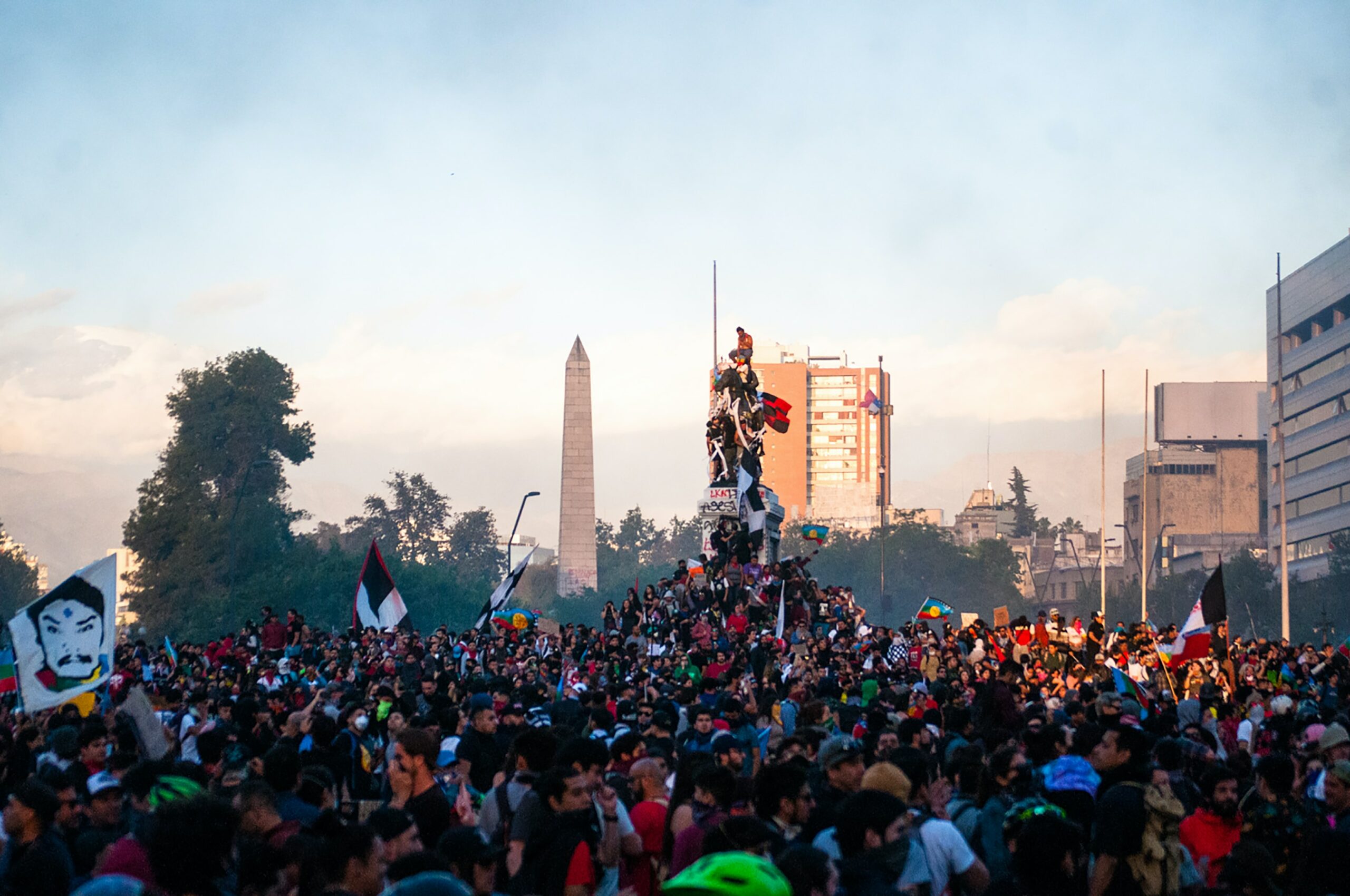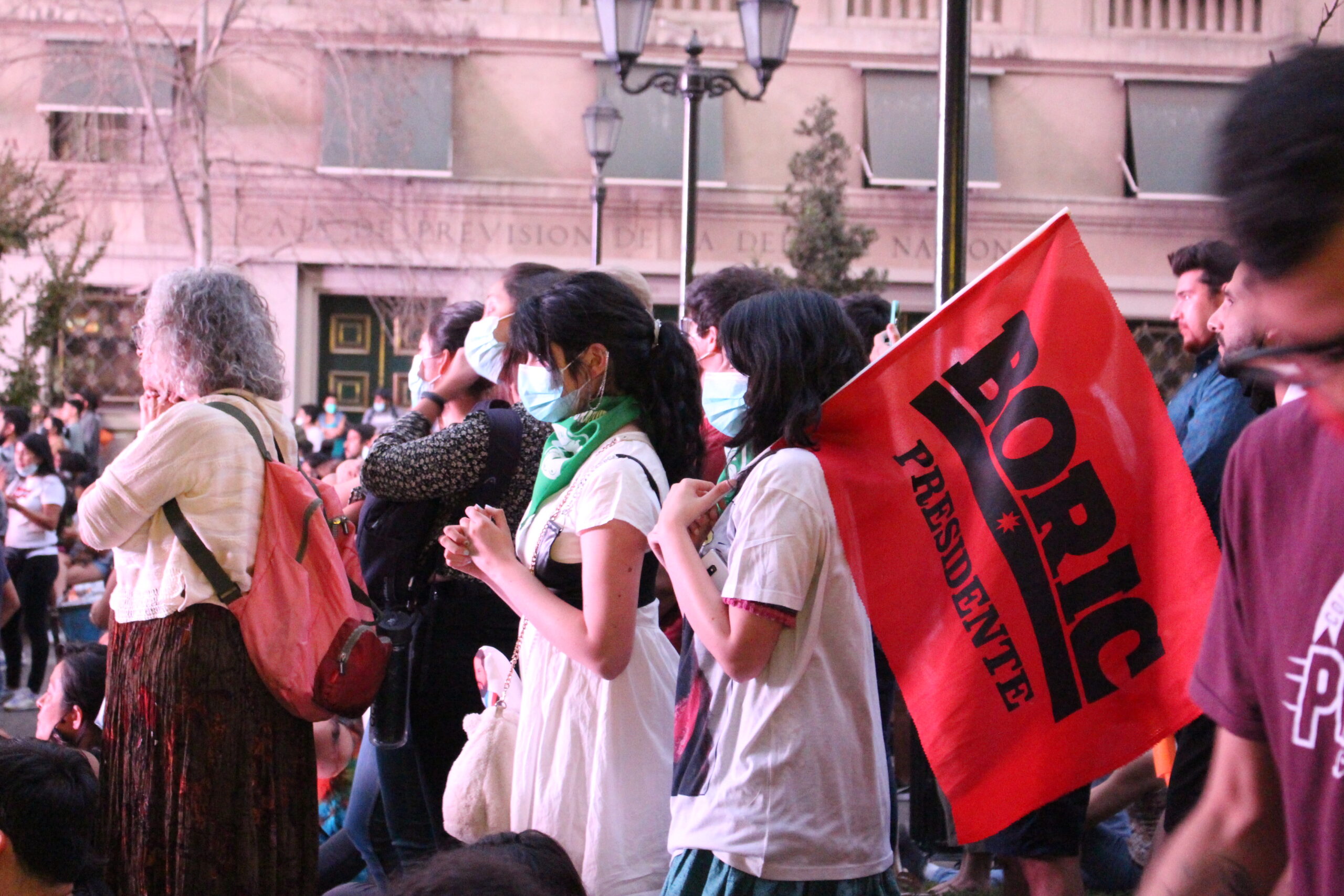Their anti-rape performance went viral globally. Now what?
LASTESIS was part of a progressive movement in Chile. Then voters rejected the country’s new constitution. So now what?
Naomi Larsson Piñeda
17 Mar 2023

Sibila Sotomayor, Dafne Valdés and Paula Cometa, members of LASTESIS, in Valparaiso, Chile. Image by Maca Jo
This article was originally published on openDemocracy.
Content warning: mention of rape.
Back in November 2019, a group of women took over the streets of Valparaiso, Chile. Moving their bodies in unison, they chanted words that would go on to resonate with hundreds of thousands of people across the world.
This performance by the collective LASTESIS (The Thesis) became a global feminist anthem within days. Blindfolded and wearing the green scarves of the Latin American abortion rights movement, they called out patriarchal and state violence against women. “It’s not my fault, not where I was, not what I wore… the rapist is you. It’s the police, it’s the judges,” they cried.
These words are “absolutely global”, LASTESIS tell openDemocracy over a blurry WhatsApp call. “When people asked us why we think this performance went viral, we say we don’t know, but probably because patriarchal violence, and specifically the sexual violence that we denounce in this performance, is everywhere.”
‘Un violador en tu camino’ (‘A Rapist in Your Path’) spread across Latin America and very soon the rest of the world. Performances took place in Poland, Kenya, to the UK, even outside the trial of convicted sex offender Harvey Weinstein. It’s believed that it was performed in about 200 cities globally, with the countries translating LASTESIS’ words into their own languages.
They add: “It’s incredible for us to see, despite our cultural and linguistic differences, that we can always connect.
“The way of approaching the subject may be different, or how we relate, but the problem is the same. On the one hand it makes you feel part of a much broader, transcultural, cross-border, underground community, but on the other hand it is very depressing to see that the work needs to be done everywhere.”
In the wake of ‘Un violador en tu camino’, and while shut inside their homes as the pandemic closed the world down, LASTESIS wrote their first manifesto, ‘Quemar el miedo’ (‘Set Fear on Fire’). It is a fierce, raw testimony of what drives them as a collective, but also an angry account of the violence and struggles they face as Chilean women, as Latin American women: they are daughters of political refugees, they have had illegal abortions, they have raised children alone, they have been abused, they have been persecuted for speaking their minds. But like their viral performance, the manifesto speaks to an intersectional, cross-border struggle.
“[We show] that there’s a feminist network with its own causes and its own fights, but also with common causes. We can communicate in different ways but we can work together to solve things together,” they say.
LASTESIS are speaking to me as they sit together in a corridor between panel talks at a New York University. Dafne Valdés Vargas, Paula Cometa Stange, Sibila Sotomayor van Rysseghem (a fourth member, Lea Cáceres, left the group a few years ago) are in the United States to celebrate the launch of ‘Set Fear on Fire’, the new translation that will bring their feminist writing to the English-speaking world. As a collective, Dafne, Paula and Sibila prefer to speak as one. In their book, they write as “we”, not as individuals, which backs up their call for a unified feminist struggle.
They’re all close friends, having met years ago while studying; but their relationship feels exactly as you would define ‘collective’. It is one of mutual respect and love, but they also have a level of understanding and ease between one another that feels deeper than many familiar relationships.
All artists and creatives, they formed LASTESIS in 2017 to engage feminist theory and activism through art and performance. Their work is based on feminist thinkers such as Silvia Federici, who critiqued the joint forces of capitalism and patriarchy that feed off oppression. ‘Un Violador en tu Camino’ builds on the work of Rita Segato and Virginie Despentes and their exposure of sexual violence as a political issue.
“We chose this way of expressing ourselves and working because we believe in art as a tool for social transformation,” they say, adding that the medium of performance “allows you to transmit ideas, transmit demands, but also pass them through the body. Not all people can relate to words in the same way, but the language of the body… is another form of communication.”
The performances (which can be most simply explained as the expression of themes and ideas through lyrics and movement) are clear and powerful, dissecting issues such as police brutality, to the complexities of abortion and fight for reproductive rights.
‘Set Fear on Fire’ includes the lyrics of past performances, and although every word written then is still relevant, so much has changed. The world of 2019 feels very distant – especially for many Chileans.
LASTESIS first performed ‘Un violador en tu camino’ within the context of a historic social uprising that saw people of all ages and identities across the country protest against inequality.
For a time, millions were trying to erase the neoliberal and violent hangovers of its past dictatorship. There were glimmers of hope: the right-wing billionaire president Sebastián Piñera was replaced by leftist millennial Gabriel Boric. The protests demanded the rewriting of the country’s Pinochet-era constitution, and the proposed alternative was viewed as one of the most progressive in the world. But it was rejected by 62% of the citizens last year.
“We’re in a much more depressing time now, but the ideas in this book are still topical,” they say.
“There’s a whole chapter dedicated to the abortion rights that the new constitution was going to guarantee. But that was then rejected, and now we’re starting again at ground zero.”
This month, Chile launched a fresh attempt – less inclusive and with an expected more moderate outcome – to come up with a new constitution, with a group of experts appointed by the Congress to work on a preliminary draft of 12 constitutional bases within the next three months. This document will set the groundwork for a 50-member constitutional council to be elected by popular vote in May. The council should achieve a final text for a vote of approval or rejection in December.
Since the 2022 repeal of Roe v Wade, the ruling that had enshrined the right to abortion in the US, “we’ve seen more losses of rights than gains… As feminists we have to always be alert,” they add. “On the other hand, in Argentina, for example, abortion was legalised. So we’ve also had an important victory, but it derives from a very powerful level of organising they were doing for almost 15 years.”
The book’s English version acknowledges this international, shared struggle; the group’s calls for safe and legal access to abortion and their criticisms of the capitalist structures supporting patriarchal violence resonate beyond borders. But the movement of these ideas has another level of significance. As they write in the updated prologue: “Our bodies remain in the South, but our convictions and many of our uncertainties migrate to the North.”
“With all the criticisms we have of the English-speaking colonial linguistic hegemony, it’s equally a reality that this [book] will allow our ideas to migrate north… when most translations come from the North to the South,” they say. “So this movement also seems important for the feminist struggle in the South.”
The fact that they were invited to New York to celebrate the launch of ‘Set Fear on Fire’ feels especially significant, particularly as Latines. “Our ideas travel here but in the meantime there are many people who are physically emigrating and are not well received – they’re received with precisely all of this violence that we denounce in this book,” LASTESIS say. “So it is a bit of a statement knowing that this book was going to reach the north and reminding them of the policies of exclusion and violence that are happening at this very moment on its borders.”
LASTESIS want to leave open the “invitation for people to get a bit more angry”, as indifference sustains the status quo, they argue. “The lack of empathy allows everything to continue as it is, reproducing this violence and oppression that have simply been normalised. And thanks to rage we can mobilise ourselves, and also mobilise the world.”
The contribution of our members is crucial. Their support enables us to be proudly independent, challenge the whitewashed media landscape and most importantly, platform the work of marginalised communities. To continue this mission, we need to grow gal-dem to 6,000 members – and we can only do this with your support.
As a member you will enjoy exclusive access to our gal-dem Discord channel and Culture Club, live chats with our editors, skill shares, discounts, events, newsletters and more! Support our community and become a member today from as little as £4.99 a month.

Chileans have rejected radical constitutional change. But the people will see this movement through

How I May Destroy You is helping make stealthing a crime in Chile

With new president Gabriel Boric, real hope returns to Chile






